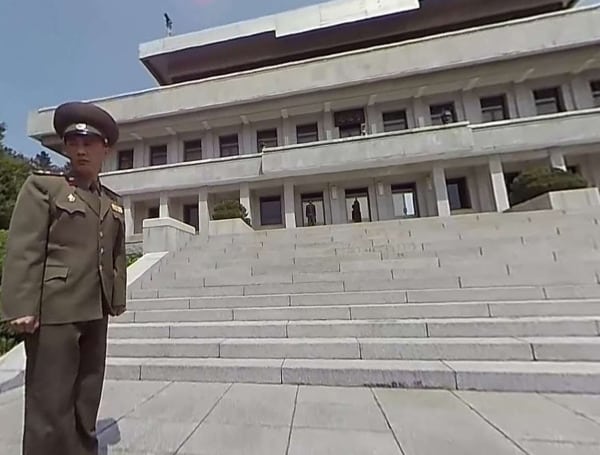In a dramatic turn of events Tuesday, South Korea’s National Assembly reversed President Yoon Suk Yeol’s surprise martial law declaration, a move that had plunged the country into a constitutional crisis. The unicameral assembly, controlled by the opposition Democratic Party, voted unanimously to nullify the declaration, asserting its authority and averting a potential escalation.
President Yoon, citing threats from “pro-North Korean elements” and the need to safeguard South Korea’s constitutional order, announced the imposition of martial law in a surprise televised address. The proclamation, which took effect at 11 p.m. local time, suspended all political activity and authorized sweeping powers to the military, including the ability to arrest individuals without a warrant.
READ: China Announces Export Ban On Key Minerals In Retaliation To U.S. Trade Restrictions
“I declare martial law to protect the free Republic of Korea from the threat of North Korean communist forces… and to protect the free constitutional order,” Yoon said in his address. He accused the center-left Democratic Party of undermining the government through efforts to impeach officials and seize control of the budget process.
The decision marked the first time in 44 years that South Korea had been placed under martial law, sparking widespread protests and condemnation from across the political spectrum.
Within hours of Yoon’s announcement, the Democratic Party convened an emergency session, rallying lawmakers to the National Assembly. Of the 300-member legislature, 190 were present, and all voted to overturn the martial law declaration.
National Assembly Speaker Woo Son-shik declared the president’s move “null and void” following the resolution. He ordered the military and police to leave the assembly compound and warned against further escalation. “The constitutional framework of our Republic cannot be upended by unilateral action,” Woo said.
READ: Veterans Orgs Accuse Biden-Harris VA Of Stonewalling Access To Medical Care
South Korea’s constitution grants the president authority to declare martial law in emergencies but requires notification of the National Assembly, which retains the power to lift it with a majority vote. The constitution stipulates that the president “shall comply” with such a request, but how Yoon will respond remains uncertain.
Yoon’s declaration was met with swift backlash from both opposition and members of his own conservative People Power Party. The party’s leader condemned the move as “wrong” and vowed to oppose it.
Lee Jae-myung, leader of the Democratic Party, described the declaration as a step toward military rule. “Tanks, armored personnel carriers, and soldiers with guns and knives will rule the country,” Lee warned during a livestream. Protests erupted across South Korea, with demonstrators decrying the return of authoritarian measures reminiscent of South Korea’s pre-democracy era.
The crisis has deepened political divides in South Korea, with Yoon’s approval ratings already at record lows. Analysts suggest his declaration reflects desperation in the face of mounting opposition pressure and legislative challenges.
READ: Hamas Publishes Heartbreaking Coerced Video Of American-Israeli Hostage Edan Alexander
While Yoon has yet to respond to the National Assembly’s vote, his political future hangs in the balance. Opposition lawmakers have called for his resignation, while citizens continue to take to the streets in protest.
Previous Reporting: South Korean President Yoon Suk Yeol declared martial law late Tuesday night, accusing the opposition-controlled parliament of sympathizing with North Korea and engaging in anti-state activities.
Yoon’s announcement, made during a televised address, cited a recent motion by the Democratic Party to impeach top prosecutors and reject a government budget proposal as justification for his actions. He vowed to “eradicate pro-North Korean forces and protect the constitutional democratic order.”
READ: Jake Sullivan: Biden Focused On Strengthening Ukraine Ahead Of Trump Transition
The declaration has sparked immediate controversy and concern. The parliament speaker is reportedly attempting to convene an emergency session, but access to the parliament building may be blocked. The Democratic Party has also called for an emergency meeting of its lawmakers.
This unprecedented move comes amid heightened political tensions in South Korea. President Yoon, whose approval ratings have declined in recent months, has faced challenges in advancing his agenda against a parliament dominated by the opposition.
The impasse over the budget bill and Yoon’s refusal to allow independent investigations into scandals involving his wife and top officials have further fueled political discord.
READ: Delaware Judge Strikes Down Elon Musk’s Multibillion-Dollar Tesla Compensation Package
The full implications of Yoon’s declaration of martial law remain unclear. It is uncertain what specific measures will be implemented and how they will impact the country’s governance and democratic processes.
This situation is developing rapidly, and the international community is closely watching the events unfold in South Korea.
Please make a small donation to the Tampa Free Press to help sustain independent journalism. Your contribution enables us to continue delivering high-quality, local, and national news coverage.
Android Users: Download our free app to stay up-to-date on the latest news.
Connect with us: Follow the Tampa Free Press on Facebook and Twitter for breaking news and updates.
Sign up: Subscribe to our free newsletter for a curated selection of top stories delivered straight to your inbox.

